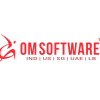-
About
- About Listly
- Community & Support
- Howto
- Chrome Extension
- Bookmarklet
- WordPress Plugin
- Listly Premium
- Privacy
- Terms
- DMCA Copyright
- © 2010-2025 Boomy Labs

 Om Software
Om Software
Listly by Om Software
There is currently no vaccine to prevent coronavirus disease 2019 (COVID-19).
1. Avoid close contact with people who are sick.
2. Avoid touching your eyes, nose, and mouth.
3. Stay home when you are sick.
4. Cover your cough or sneeze with a tissue, then throw the tissue in the trash.
Let us know or shoot us an email at : info@omsoftware.net and we will get back to you.
More Information visit us : https://www.omsoftware.net/

Healthcare management systems, also known as healthcare information management systems, are designed to help healthcare providers collect, store, retrieve and exchange patient healthcare information more efficiently and enable better patient care.
These technology projects — which are often compliance-driven — can require significant investments in time and resources. When selecting and implementing a healthcare management system, providers should keep three things in mind.
1. There are two main types of healthcare management systems — electronic health records (EHR) and practice management — which organizations will need to evaluate, depending on their size, business needs, and compliance demands.
Many healthcare providers are moving to EHR systems to meet the Health Information Technology for Economic and Clinical Health Act (HITECH) compliance deadline in 2015; others are doing it simply to modernize their operations.
Practice management software solutions, which can be connected to EHR systems, are typically used by small and midsize medical practices to organize specific details about patients and the care that they receive from the practice.
2. Most healthcare management systems, especially for large healthcare providers, are delivered as Software-as-a-Service (SaaS) solutions.
Because the software is delivered on demand via the cloud, and not through internal systems, healthcare providers need to be especially mindful about maintaining the privacy and security of PHI (patient protected health information).
When choosing a SaaS vendor to deliver their healthcare management system, providers therefore need to ask, and receive clear answers for, a number of questions, such as:
How do you keep data secure?
Where is the data stored?
How do your practices fulfill our compliance requirements, such as with the Health Insurance Portability and Accountability Act (HIPAA)?
3. A healthcare management system is much more than an IT project.
Implementing a new technology infrastructure and digitizing clinical and patient information are only parts of the process of moving to a healthcare management system. There is also a critical “people component.”
Medical professionals who will be using the system every day — doctors, nurses, technicians, medical receptionists and many others — need to be engaged early in the process so they have a say in how the system is designed, receive appropriate training, and have ample time to prepare for what will be a monumental shift in how they work.
Many providers decide to seek outside assistance to help ensure a seamless transition to a healthcare management system. For example, they turn to project staffing services that can provide consultants with healthcare management and business systems expertise.
They may also look to compliance experts for guidance on how to implement systems that meet the requirements of HIPAA, HITECH and other relevant regulations.
For more on HIPAA compliance and other challenges facing today’s healthcare providers, visit OMSOFTWARE website https://www.omsoftware.net/

There is currently no vaccine to prevent coronavirus disease 2019 (COVID-19). The best way to prevent illness is to avoid being exposed to this virus. However, as a reminder, CDC always recommends everyday preventive actions to help prevent the spread of respiratory diseases, including:
Avoid close contact with people who are sick.
Avoid touching your eyes, nose, and mouth.
Stay home when you are sick.
Cover your cough or sneeze with a tissue, then throw the tissue in the trash.
Clean and disinfect frequently touched objects and surfaces using a regular household cleaning spray or wipe.
Follow CDC’s recommendations for using a facemask.
CDC does not recommend that people who are well wear a facemask to protect themselves from respiratory diseases, including COVID-19.
Facemasks should be used by people who show symptoms of COVID-19 to help prevent the spread of the disease to others. The use of facemasks is also crucial for health workers and people who are taking care of someone in close settings (at home or in a health care facility).
Wash your hands often with soap and water for at least 20 seconds, especially after going to the bathroom; before eating; and after blowing your nose, coughing, or sneezing.
If soap and water are not readily available, use an alcohol-based hand sanitizer with at least 60% alcohol. Always wash hands with soap and water if hands are visibly dirty.

**Established in 2004, OM Software is a web development firm specializing in eBusiness optimization solutions for companies across the globe. OM Software offers a compl...